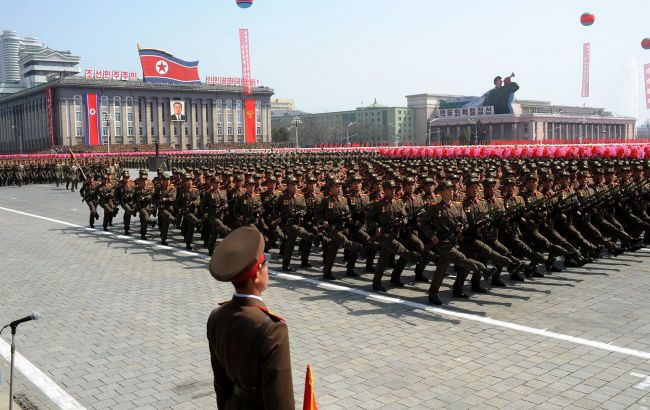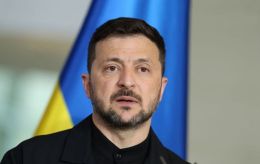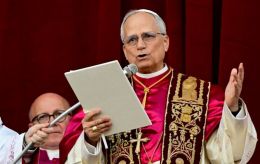North Korean troops near frontline? What it means and how Russia might use them
 Photo: There is a threat that the DPRK will send troops to Ukraine in support of Russia (Getty Images)
Photo: There is a threat that the DPRK will send troops to Ukraine in support of Russia (Getty Images)
The media reported that North Korea, in support of the Russian Federation, was going to send its construction and engineering forces to the occupied areas of the Donetsk region next month. They are supposed to be involved in "reconstruction work".
To find out whether the Democratic People's Republic of Korea troops will appear near the front and how they can be used by the Russian army, read the material by RBC-Ukraine below.
Contents:
- What is known about the possible sending of DPRK units to Ukraine
- Cooperation between Russia and North Korea
- Ukraine's reaction
- How Russia can use DPRK troops in Ukraine
- Possibility of North Korea participating in hostilities
What is known about the possible sending of DPRK units to Ukraine
The first to report on the possible deployment of large-scale DPRK engineering troops to Ukraine was the South Korean TV network TV Chosun. The TV channel quoted an unnamed government source claiming that the North Korean armed forces have 10 engineering brigades, of which three or four could be sent to the Donetsk region. Military expert Pavlo Narozhnyy explained in a commentary to RBC-Ukraine, using the example of Ukrainian and Russian brigades, that each brigade could consist of around 5,000 people, meaning a total of approximately 15,000-20,000 troops.
"There can be up to 5,000 people in one brigade. But this is an example of a Russian or Ukrainian brigade. The exact composition of a North Korean brigade needs further study, but I think the situation is similar," he said.
TV Chosun journalists have calculated that the DPRK could receive up to $115 million annually from Russia for such "services." It is claimed that North Korean citizens would arrive in the occupied territories of Ukraine by July this year to participate in so-called "restoration works."
The Institute for the Study of War (ISW) also commented on this news. They noted that they have not yet seen any evidence that North Korean military personnel intend to participate in hostilities in Ukraine. However, direct engineering support from the DPRK could free up some Russian forces for operations along the front line and contribute to Russia's efforts to expand military infrastructure and defensive fortifications in the occupied territory of Ukraine.
The ISW also notes that Russia seems to be seeking to create a coalition of friendly states with historically warm ties to the former Soviet Union, including North Korea and Vietnam, to form the basis of an alternative world order.
Cooperation between Russia and North Korea
Notably, the news of the possible deployment of North Korean engineering troops was preceded by a visit from Russian President Vladimir Putin to North Korea. During this visit, he and North Korean leader Kim Jong Un signed a treaty on a comprehensive strategic partnership. This agreement includes mutual assistance in case of an attack on either signatory and obligates the countries to cooperate in defense and military technologies, as well as in the fields of economy and science. At that time, the North Korean dictator expressed "unconditional support" for Russia in its war against Ukraine. Later, Putin tried to downplay the importance of the agreement and the possibility of North Korean troops being deployed in Ukraine.
However, South Korea immediately reacted to the agreement. It promised to reconsider its position on arms supplies to Ukraine. Seoul claims that it will not have any deterrents to supplying lethal weapons to Ukraine if Russia transfers high-precision weapons to North Korea.
However, even before the signing of this agreement, the DPRK had already provided significant assistance to Putin in the war. For example, South Korea recently estimated that Pyongyang has sent containers to Russia that can hold almost 5 million artillery shells. And the support will not stop there, as Putin will ask for more, Seoul noted. It is also known that Moscow uses North Korean ballistic missiles in attacks on Ukraine.
Ukraine's reaction
Meanwhile, the Office of the President of Ukraine criticized the lack of any global reaction to North Korea's decision to send its engineering troops to assist the Russians.
"Not only has North Korea calmly bypassed global sanctions and actively engaged in military cooperation with Russia, but now it is directly sending special engineering troops to participate in the war against Ukraine on the side of the aggressor. So what? Nothing. Silence," wrote Mykhailo Podolyak, adviser to the head of the Office of the President, on his Telegram channel.
He pointed out that instead of an appropriate response, the UN invited Russia's Interior Minister Vladimir Kolokoltsev, who is under severe personal sanctions, to a Peace Summit to publicly discuss peacemaking.
"It is this demonstrative disregard of North Korea's direct participation in the war on the side of Russia and the invitation of the authors of the genocidal war to summits that leads to a just end (sarcasm). We need to invest more in the UN and wait for effectiveness (repeated sarcasm)," added Podolyak.
How Russia can use DPRK troops in Ukraine
According to expert Pavlo Narozhnyy, it is highly likely that North Korean troops will do exactly what engineering brigades do. For example, they are building fortifications, railroads, and bridges.
"I'm sure that they will be dealing with military issues. That is, to build various military infrastructures. In particular, to build caponiers (fortifications that provide flanking or longitudinal fire in two opposite directions - ed.), fortifications of the 2nd and 3rd lines. I don't think they will build any civilian objects, such as schools or residential buildings that the Russians destroyed," the source said.
In turn, Ivan Kyrychevskyi, an expert at the Defense Express information and consulting agency, takes a more skeptical view of whether the Russians truly need engineering troops for their war efforts.
"It is possible that South Korea may have insufficient understanding of what is happening in Ukraine and where, and what can be done in the temporarily occupied Donbas. Accordingly, their assessment of what the North Korean troops at the disposal of the racists can do in the temporarily occupied territory of Ukraine is a shot in the dark or guesswork," Kyrychevskyi said.
According to him, the only somewhat substantiated argument could be that one shouldn't rule out the deployment of North Korean personnel to support the Russians. The expert explains that there are people to dig in the Russian army. After all, according to DeepState's calculations, they have already dug 6,000 kilometers and continue to do so, and "they don't need North Koreans for this." The same cannot be said about the human resources that can be used during assaults.
"The Russians, in fact, as part of their mobilization processes, are constantly forming new engineering units within the Russian army. But they have other issues that are more problematic. In particular, the replenishment of human resources for their summer offensive. And for this, they need to declare a new wave of mobilization or seek alternative sources. They have some experience in using mercenaries. They learn the language of the contingent they are recruiting in order to give them some basic commands, but to send them on an assault. So, instead of new waves of mobilization, they can do the same with the North Koreans. That's the problem," Kyrychevskyi notes and adds that this is only an assumption, as there is currently insufficient data for a thorough analysis.
Possibility of North Korea participating in hostilities
Earlier, the possibility of DPRK troops participating in the Russian war against Ukraine was commented on by the US Department of Defense. Thus, Pentagon spokesman Pat Ryder did not rule out such a scenario and at the same time said that North Korean troops would become "cannon fodder" if they were sent to fight alongside Russian invaders in Ukraine
“If I were North Korean military personnel management, I would be questioning my choice of sending my forces to be cannon fodder in an illegal war against Ukraine. And we’ve seen the kinds of casualties that Russian forces,” he said at a press briefing on June 25.
Expert Pavlo Narozhnyy emphasizes that if the Russians involve North Koreans in the fighting in Ukraine, it will quickly become known. According to him, in any case, it will end with someone being captured or appearing in some video online. Therefore, hiding Pyongyang's involvement in combat actions would be absolutely unrealistic.
"Imagine a scenario where North Korean troops are building a railway, and Ukrainian Defense Forces are shelling, destroying occupiers along with engineering units. Then North Korea said, 'This is a declaration of war against us because they were on Russian territory,' as they consider the Donetsk region to be Russian territory. In theory, they could drag in such a story and send in combat units," speculates Narozhnyy.
At the same time, the expert explains that this scenario will end very badly for North Korea. First of all, it does not have a large army, although it is quite powerful, and Pyongyang's main target is not Ukraine, but South Korea.
"That is, they have enough problems of their own. They can theoretically send a significant number of soldiers, tens or hundreds of thousands because they have these soldiers. Because North Korea, like any dictatorship, is preparing for war, but the question is whether they are ready to take this step. If they send some more or less combat-ready units, then South Korea will know that the DPRK has 20 or 50 thousand soldiers there. That is, they have enough problems of their own, so I think sending combat-ready units from North Korea to Ukraine is unrealistic," Narozhnyy adds.
Earlier, RBC-Ukraine wrote about why Putin needs an alliance with North Korea and whether it will affect the Russian-Ukrainian war. Read the material here.
Sources: publications by TV Chosun, ISW, the Telegram channel of Mykhailo Podolyak, advisor to the head of the Presidential Office, a statement by Pentagon spokesman Patrick Ryder, exclusive comments by military expert Pavlo Narozhnyy and expert of the Defense Express information and consulting agency Ivan Kyrychevskyi.

